Encourages banks to directly invest in Pakistan’s financial sector, trade flows
Finance Minister Muhammad Aurangzeb speaks during a Reuters interview at the 2025 annual IMF/World Bank Spring Meetings in Washington, DC, US, April 25, 2025. Photo: Reuters/ File
Union Minister for Finance and Revenue Senator Muhammad Aurangzeb concluded his visit to Washington, DC, with a series of important meetings on the last day of his participation in the annual meetings of the International Monetary Fund (IMF) and the World Bank.
The minister met with the senior management of Abu Dhabi Commercial Bank (ADCB) and briefed them on the launch of Pakistan’s Panda Bond and refreshment of the Global Medium-Term Note (GMTN) programme, a press release said.
He gave an update on the progress of the privatization program and expressed optimism over the accelerated privatization of the national carrier.
Aurangzeb informed the ADCB team that the Government of Pakistan was close to achieving financial closure on the Reko Diq project and looked forward to Exim Bank’s participation.
He urged the bank to take direct exposure in Pakistan’s financial sector and intermediary trade and investment flows.
In a separate meeting with senior management of JP Morgan, the finance minister shared details of the upcoming inaugural launch of the green panda bond in the Chinese market. He also gave a comprehensive overview of the privatization programme, including the G2G sale of First Women Bank, which was recently approved by the Federal Cabinet.
Senator Aurangzeb highlighted the growing US corporate interest in the Reko Diq project and expected Exim Bank’s early participation in the syndication process.
He also discussed opportunities for digital collaboration between Saudi Arabia and Pakistan through the GO AI Hub and encouraged JP Morgan to explore further areas of partnership.
The Minister of Finance also met with Mehmet Simsek, Minister of Finance and Finance of Türkiye, where both sides confirmed the strong bilateral ties and frequent engagements at the leadership level between the two countries.
Senator Aurangzeb highlighted Pakistan’s ongoing reforms in taxation, energy, state-owned enterprises (SOE), privatization and public finance.
He referred to the event hosted by the World Bank showcasing the transformation journey of Pakistan’s Federal Board of Revenue (FBR) and agreed on the importance of increasing the tax-to-GDP ratio and integrating data across government agencies.
Read: The IMF unlocks DKK 1.2 billion. USD after the government revisits pre-flood pledges
In his meeting with International Finance Corporation (IFC) CEO Makhtar Diop, Senator Aurangzeb welcomed IFC’s decision to upgrade Pakistan as a regional hub.
He briefed the director on the progress of the Reko Diq project and expressed hope that Exim Bank would soon join the financing consortium.
The minister appreciated IFC’s ongoing support in subnational finance and digital payment rights (DPR) as well as its advisory services in the pharmaceutical, electric vehicle (EV) and commodity exchange sectors.
He also welcomed the upcoming visit of the IFC Managing Director to Pakistan during the spring meetings and witnessed the signing of a swap agreement between the State Bank of Pakistan (SBP) and the IFC.
Senator Aurangzeb also participated in the 15th V20 Ministerial Dialogue on “Cost of Capital, Debt and Growth Paths.” In his remarks, he highlighted the devastating impact of recurring floods in Pakistan and stressed the government’s commitment to funding rescue and relief operations from its own resources.
He appreciated the support of the CVF-V20 Secretariat in the development of Pakistan’s Climate Plan for Prosperity (CPP) and noted that funding was available through the Country Partnership Framework (CPF) to operationalize it.
The minister called for a rapid operationalization of the loss and damage fund and emphasized the need for accelerated decision-making within the Green Climate Fund (GCF).
During his visit, the minister also engaged with US-based Pakistani media where he gave a comprehensive briefing on his week-long discussions and engagements with international financial institutions, partner countries and private sector stakeholders.
Read more: IMF projects Pakistan’s growth at 3.6%
Senator Muhammad Aurangzeb’s participation in the IMF-World Bank annual meetings and his extensive engagements with global financial institutions confirm Pakistan’s commitment to economic reforms, fiscal responsibility and international cooperation.
IMF agreement
Prime Minister Shehbaz Sharif confirmed a staff-level agreement with the International Monetary Fund to disburse $1.2 billion and expressed hope that it would be the last such program for Pakistan.
Chairing a cabinet meeting on Thursday, he said the time had come to “free us from the burden of debt”. Hard work is the first condition of national independence and dignity,” said Shehbaz, adding that Pakistan’s economic stability would strengthen its global voice and respect.
The IMF announced the agreement on Wednesday to release the next loan tranches of $1.2 billion, after Islamabad so far agreed to the old budget targets before floods and to publish the government report before the board meeting.
After approval by the board, Pakistan will have access to about $1 billion under the EFF and another $200 million under the RSF, Iva Petrova said. Cumulatively, the IMF will disburse $3.1 billion under the EFF out of the $7 billion agreement.
Read also: Prime Minister hopes IMF agrees Pakistan’s final loan deal
The IMF on Tuesday forecast Pakistan’s economic growth rate of 3.6% for the current fiscal year as Finance Minister Muhammad Aurangzeb expressed hope that a staff-level agreement with the lender for two tranches worth $1.2 billion would be reached this week.
The IMF released the World Economic Outlook report from Washington projecting Pakistan’s economic growth rate at 3.6%. But it clarified that Pakistan’s economic “projections do not yet reflect the impact of floods in the summer of 2025, the effects of which are still being assessed”.



